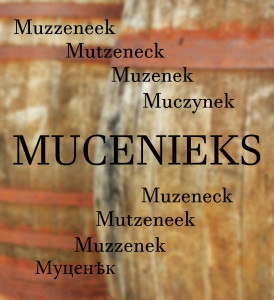This is the second in a series about myths relating to Latvian genealogy. Go check out the first one about record availability here!
Today’s myth: “My ancestors only spelled their surname one way.”
Wrong. Very wrong. Very incredibly wrong. If you have a Latvian ancestor, unless their name is on a very short list of very short names (Apse, Egle, Irbe and the like) I can absolutely guarantee that it has at least one other possible spelling. And even the names I noted in the previous sentence could appear in derivative forms.
This is one of the most important, if not THE most important, thing that people need to remember when doing Latvian genealogy. Why? It all comes down to various occupations and various languages that names were spelled in.

Just a sampling of the different ways to write “Mucenieks”, meaning “barrel-maker”. Stock photo from Pixabay.
Latvia only became an independent country in 1918. This means that it was only then that Latvian became an official language of a country. Occupying powers considered Latvian a peasant tongue that was best ignored and hoped it would die out (it didn’t). This means that standardized spelling was only introduced when Latvia became an independent country. Prior to that, Latvian didn’t use macrons (the horizontal lines on Ä€, Ä’, Ī, Ū) or carons (the Vs on ÄŒ, Å , Ž), and the use of cedillas (the commas over or under Ä¢, Ķ, Ä», Å…) was not consistent. This means that if you know the modern spelling of a name, and it has any of those three, there will automatically be a different spelling in the old records. And the reverse is also true – if your ancestors emigrated prior to standardized spelling, looking in documents written in the modern era that could mention your ancestors, you will need to know the modern spelling of your name to be able to find them.
Even if your name does not have macrons, carons or cedillas, remember that Latvian was also written according to German spelling rules prior to the 1920s, so some letters may be different – Zs were used in place of Cs, Ss in place of Zs, and so on (for a full primer on these letter differences, see my post O is for Orthography). This adds yet another dimension to name spellings.
Then there are diminutives. Latvians love diminutives on names (the endings -iņš/iņa and -Ä«tis/Ä«te). The German and Russian authorities, however, did not. This means that people with diminutive names might have sometimes appeared with them in the non-diminutive forms – or vice versa, if a Latvian happened to be doing some record-keeping. So the names I mentioned above – Apse, Egle, Irbe? They could appear as ApsÄ«tis, EglÄ«tis, IrbÄ«tis, and the old spellings thereof.
It is also important to note that when spelling was standardized, and consequently name spellings were standardized, this standardization according to Latvian spelling rules happened to *all* surnames – not just ones with roots in the Latvian language. This means that Germanic names such as Rosenthal and Andersohn became RozentÄls and Andersons in Latvian spelling, while Slavic names such as Wojtkewich or Bredowsky became VoitkeviÄs and Bredovskis.
If different orthographies aren’t enough, then there’s the possibility that a name was translated from one language to another – if you can’t find your independence-era Zaļkalns (green hill) in the old records, they might be appearing as GrÄ«nbergs instead. Liepas could appear as Lindes, PuÄ·ulauks as Blumenfelds and so on. It is also possible that people just changed their name entirely (see my post Surname Changes and Popular Surnames for more) – and changes like this in the independence era can be found through a Periodika search, by searching for either the new name or the old name, because publicly announcing the name change was mandatory.
If you have any questions on how your family name might have appeared in different eras, and the posts linked in this article haven’t helped, then please let me know in comments!
This post and others like it are made possible by my patrons on Patreon. If you find the information on my site valuable, please consider becoming my patron too!
